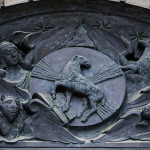We run our website the way we wished the whole internet worked: we provide high quality original content with no ads. We are funded solely by your direct support. Please consider supporting this project.

Seeing and Knowing God
There are many scripture passages that seem to suggest that the way people view God often says more about them than it does about God. Our perception of God, as well as other spiritual truths, is conditioned by the state of our heart. Jesus’ most important teaching on this matter is found in John’s Gospel where Jesus told the Pharisees that they lacked the capacity to discern how Moses wrote about him because, despite their diligent study, “the love of God was not in [their] heart” (Jn. 5:42). Whether one is able to see Jesus in Scripture, he’s saying, depends on something far more important than diligent study. It depends on a heart relationship with God.
Along the same lines, the story in Luke 24 of the two disciples with whom the resurrected Jesus walked on the road to Emmaus tells of how they were unable to recognize him in his resurrected form or to see that Moses and the Prophets wrote about him until “their eyes were open” as they broke bread together (Lk 24:30-32). As Jesus several times suggested in other teachings, one can only “see” and “hear” what their heart allows them to “see” and “hear” (e.g. Mark 4:9). Indeed, this teaching, along with a host of other Scriptures, suggests that unless the Spirit of the resurrected Christ opens our heart, we will remain blind to the way “all Scripture” points to Christ.
We find the same insight in Paul’s writing. Most importantly, he taught that just as a veil was placed over Moses’ face to shield fellow Hebrews from the brilliance of God’s glory, so too unbelievers have a veil over their minds that dulls their spiritual perception (2 Cor 3:15). Paul himself testified that, prior to his conversion, he lacked the capacity to see Jesus as anything more than a mere human. As with all unbelievers, Paul’s spiritual eyes were “blinded” by the “god of this age” so that he could not “see the light of the gospel that displays the glory of Christ, who is the image of God” (2 Cor 4:4). Only when the Spirit removes this veil in the mind and heart of a person, and only when God makes “his light shine in our hearts to give us the light of the knowledge of God’s glory,” can we see this glory “displayed in the face of Christ” (4:6).
So too, Paul writes that only by the work of the Spirit can a person be “made… competent” to be a minister of “a new covenant” by acquiring the capacity to understand Scripture according to “the Spirit” that “gives life” instead of “the letter” that “kills” (3:6). And it is only as believers “with unveiled faces” gaze upon this Christ-centered glory that they are transformed “with ever increasing glory” into Christ’s likeness. (2 Cor. 3:7-4:6).
As you begin this new year, the Spirit is at work in your heart so that the abstract truth about God’s love and glory might be made real and personal to you. May you embrace a greater sense of dependency on the Spirit by fixing your eyes on Jesus and beholding the glory of the Lord, and allowing that glory to transform you.
Photo via christianluiz via Visual Hunt
Category: General
Tags: Jesus, Transformation
Topics: Following Jesus
Related Reading

The Revelation of God in the Cross
The cross cannot be understood apart from the resurrection, just as the resurrection can never be understood apart from the cross. They are two sides of the same coin. If you consider the cross apart from the resurrection, then the crucified Christ becomes nothing more than one of the many thousands of people who were…

From Good Friday to Easter
This weekend as you contemplate the suffering, death and resurrection of Jesus, we pray that God will reveal his unfathomable love for you in new ways. Blessings to all of you from all of us at ReKnew. Photo credit: Claudio via Visualhunt / CC BY

The Final Battle in Revelation
I will conclude this series on the violent imagery in Revelation by addressing the infamous eschatological battle scene found in 19:11-21, for it is this graphically violent section of Revelation that is most frequently appealed to by those who argue against the claim that Jesus reveals an enemy-loving, non-violent God that is unconditionally opposed to…

Penal Substitution View of Atonement: Did God the Father Just Need to Vent?
In this video blog, Greg outlines the penal substitution view of atonement which says that the Father poured out his wrath on Jesus instead of us so that we could be forgiven. This view is very common and you might even be nodding your head in agreement with that description. However, this view creates some…

When Jesus Questioned the Father
Though the sinless Son of God had perfect faith, we find him asking God the Father to alter the plan to redeem the world through his sacrifice—if it is “possible” (Matt. 26:42). As the nightmare of experiencing the sin and God-forsakenness of the world was encroaching upon him, Jesus was obviously, and understandably struggling. So,…

Smack Talk on the Idolatry of the Family
Ben Ponder doesn’t pull any punches in his article Idolatry of the Family. He argues that, contrary to some evangelical claims, “Jesus didn’t die on a God-forsaken cross to preserve your horn-rimmed vision of 1950s Americana.” Can a marriage or a family become an idol? Ben thinks so. What do you think? From the article:…
